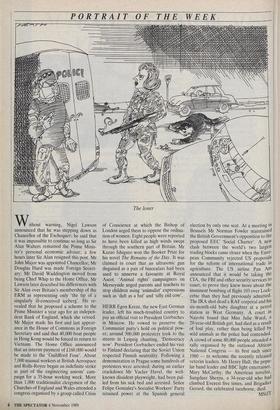PORTRAIT OF THE WEEK
The loner Without warning, Nigel Lawson announced that he was stepping down as Chancellor of the Exchequer; he said that it was impossible to continue so long as Sir Alan Walters remained the Prime Minis- ter's personal economic adviser; a few hours later Sir Alan resigned this post. Mr John Major was appointed Chancellor; Mr Douglas Hurd was made Foreign Secret- ary; Mr David Waddington moved from being Chief Whip to the Home Office, Mr Lawson later described his differences with Sir Alan over Britain's membership of the ERM as representing only 'the tip of a singularly ill-conceived iceberg'. He re- vealed that he proposed a scheme to the Prime. Minister a year ago for an indepen- dent Bank of England, which she vetoed. Mr Major made his first and last appear- ance in the House of Commons as Foreign Secretary and said that 40,000 boat people in Hong Kong would be forced to return to Vietnam. The Home Office announced that an interim payment of £160,000 would be made to the 'Guildford Four'. About 7,000 manual workers at British Aerospace and Rolls-Royce began an indefinite strike as part of the engineering unions' cam- paign for a 35-hour working week. More than 1,000 traditionalist clergymen of the Churches of England and Wales attended a congress organised by a group called Crisis of Conscience at which the Bishop of London urged them to oppose the ordina- tion of women. Eight people were reported to have been killed as high' winds swept through the southern part of Britain. Mr Kazuo Ishiguro won the Booker Prize for his novel The Remains of the Day. It was claimed in court that an ultrasonic gun disguised as a pair of binoculars had been used to unnerve a favourite at Royal Ascot. 'Animal rights' campaigners on Merseyside urged parents and teachers to stop children using `animalise expressions such as 'daft as a bat' and 'silly old cow'.
HERR Egon Krenz, the new East German leader, left his much-troubled country to pay an official visit to President Gorbachev in Moscow. He vowed to preserve the Communist party's hold on political pow- er; around 300,000 protesters took to the streets in Leipzig chanting, 'Democracy now'. President Gorbachev ended his visit to Finland declaring that the Soviet Union respected Finnish neutrality. Following a demonstration in Prague some hundreds of protesters were arrested; during an earlier crackdown Mr Vaclav Havel, the well- known dissident playwright, had been pul- led from his sick bed and arrested. Senor Felipe Gonzalez's Socialist Workers' Party retained power at the Spanish general
election by only one seat. At a meeting in Brussels Mr Norman Fowler maintained the British Government's opposition to the proposed EEC 'Social Charter'. A new clash between the world's two largest trading blocks came closer when the Euro- pean Community rejected US proposals for the reform of international trade in agriculture. The US, airline Pan An announced that it would be taking the CIA, the FBI and other security services to court, to prove they knew more about the imminent bombing of flight 103 over Lock- erbie than they had previously admitted. The IRA shot dead a RAF corporal and his six-month-old baby daughter at a petrol station in West Germany. A court in Nairobi found that Miss Julie Ward, a 29-year-old British girl, had died as a result of foul play, rather than being killed by wild animals as the police had contended. A crowd of some 80,000 people attended a rally organised by the outlawed African National Congress — its first such since 1960 — to welcome the recently released veteran leaders. Mr Henry Hall, the popu- lar band leader and BBC light entertainer, Mary McCarthy, the American novelist, Sungdare Sherpa, a 34-year-old who had climbed Everest five times, and Brigadier Gerard, the celebrated racehorse, died. MStJT
















































 Previous page
Previous page